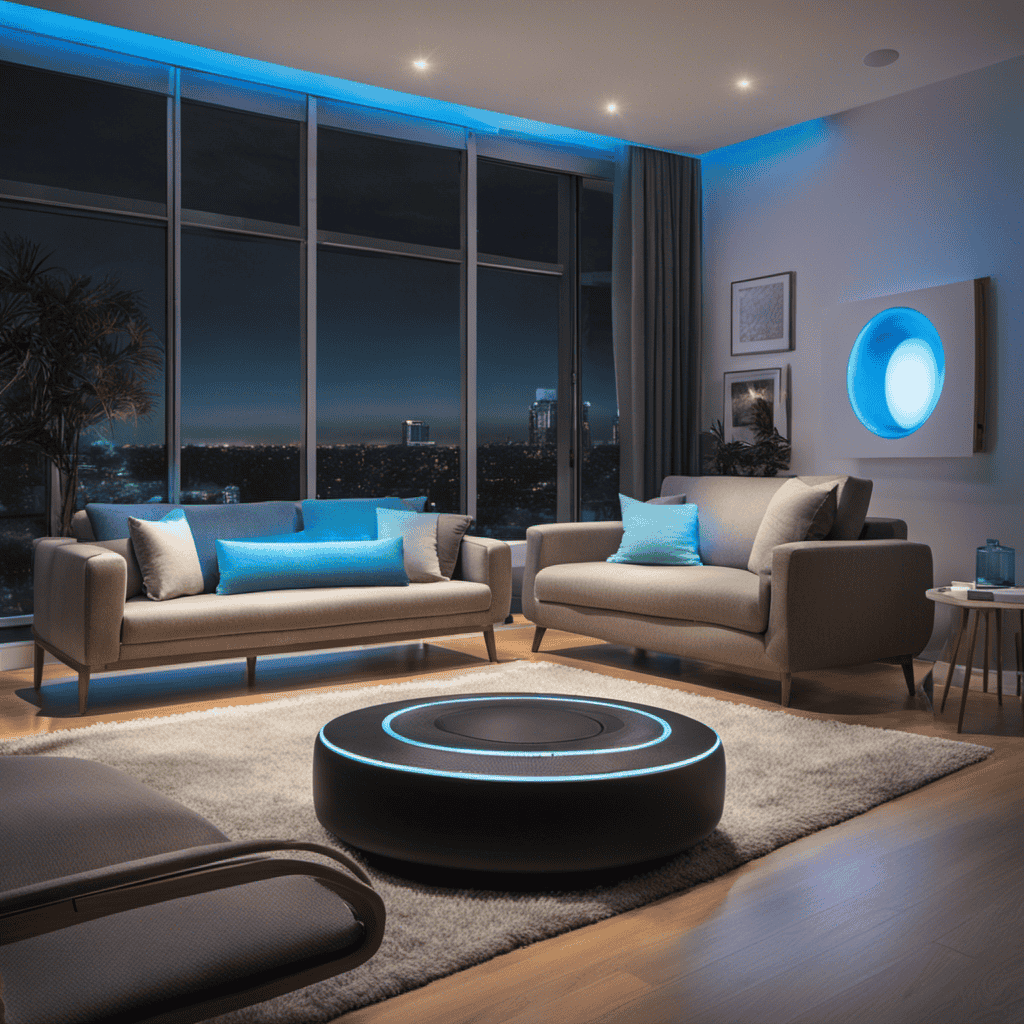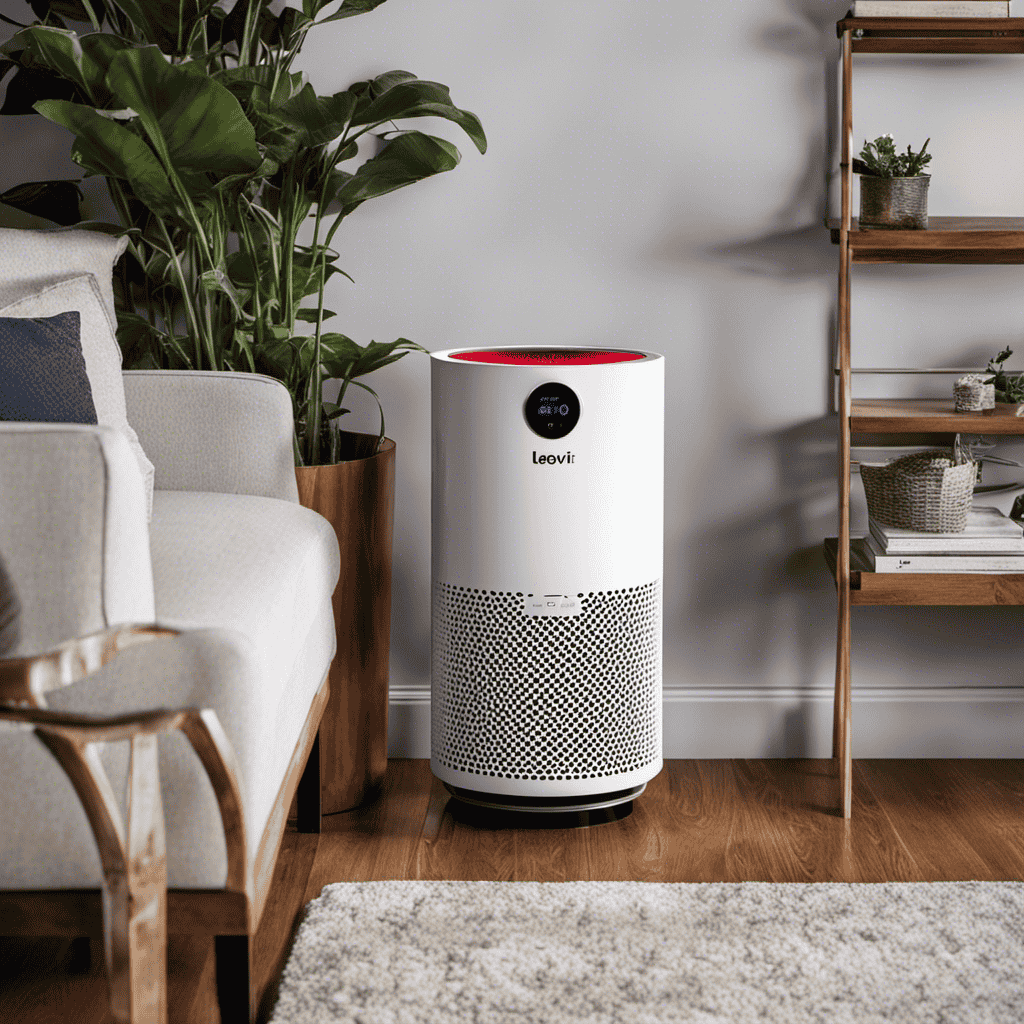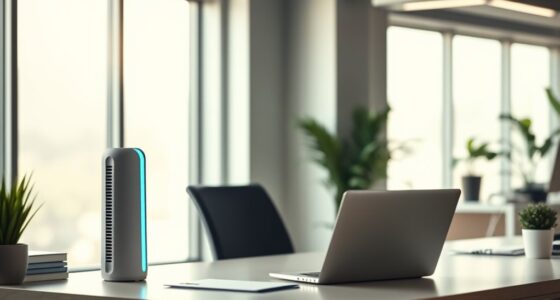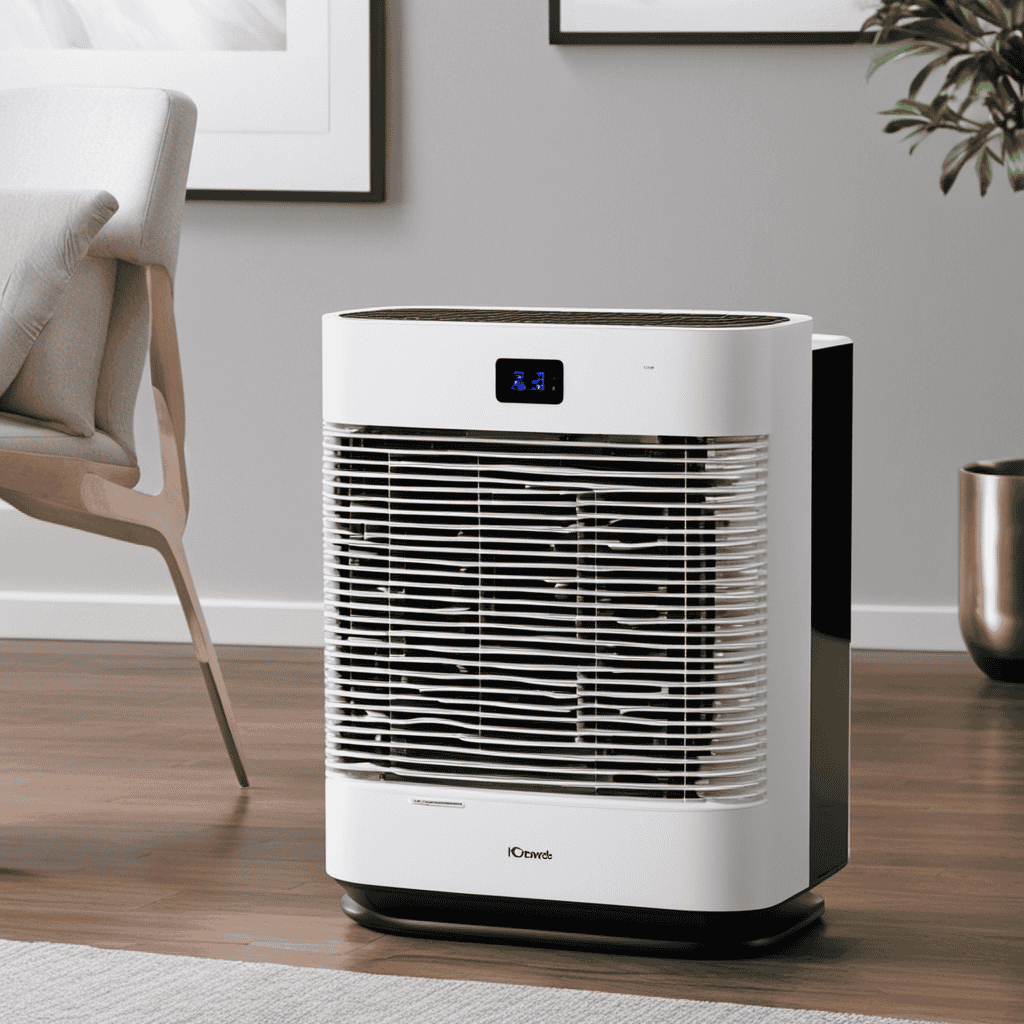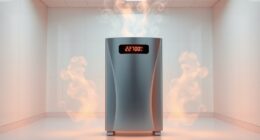As a person who owns an air purifier, I frequently contemplate: How long should my air purifier be running? It’s a dilemma that many of us grapple with, trying to find a happy medium between maintaining clean air and energy efficiency.
In this informative article, we will delve into the factors to consider when determining the optimal operating time for your air purifier. From energy consumption to room size and air quality, we’ll explore the various aspects that affect air purifier usage.
So, let’s dive in and unravel the mysteries of air purification!
Key Takeaways
- The optimal operating time of an air purifier should be determined based on factors such as room size and air quality.
- Energy efficiency is important for reducing costs and promoting a sustainable environment, so it’s important to regulate the operating time to minimize energy consumption.
- Continuous or extended operating times may be beneficial for individuals with allergies or respiratory issues.
- Proper maintenance, including cleaning and filter replacement, is essential for optimal performance and effective removal of contaminants.
Factors to Consider
There are several factors to consider when deciding how long an air purifier should stay on.
One important factor is the air purifier’s lifespan. Different models have different lifespans, and it is crucial to follow the manufacturer’s recommendations to ensure optimal performance.
Another factor to consider is the health benefits provided by the air purifier. If you have allergies or asthma, it is recommended to keep the air purifier on for longer periods to continuously filter out allergens and pollutants from the air.
However, if you are using the air purifier for general air quality improvement, running it for a few hours a day may be sufficient.
Ultimately, the decision on how long to keep the air purifier on should be based on your specific needs and the recommendations of the manufacturer.
Recommended Operating Time
The recommended operating time for an air purifier is typically based on factors like room size and air quality. It is important to understand that air purifiers work continuously to clean the air in a room, so the recommended operating time is not a fixed duration. However, to maximize the health benefits and effectiveness of an air purifier, it is generally recommended to keep it running for extended periods.
Here are some guidelines for operating an air purifier:
-
Assess the room size and air quality: Larger rooms or spaces with poor air quality may require the air purifier to run for longer periods.
-
Follow recommended maintenance: Regularly clean or replace the filters according to the manufacturer’s instructions to ensure optimal performance.
-
Consider individual needs: People with allergies or respiratory conditions may benefit from running the air purifier continuously, especially during peak allergy seasons or in areas with high pollution levels.
Energy Consumption
To minimize energy consumption, it’s important to regulate the operating time of an air purifier based on factors like room size and air quality.
Energy efficiency is crucial not only to reduce costs but also to promote a sustainable environment.
A cost analysis should be conducted to determine the optimal operating time that balances energy usage and air purification effectiveness.
By considering room size, the air purifier can be programmed to run for shorter periods in smaller spaces, thus avoiding unnecessary energy consumption.
Additionally, monitoring air quality is essential as it allows the air purifier to adjust its operating time based on the level of pollutants present.
This intelligent approach to regulating air purifier operating time maximizes energy efficiency while ensuring clean and healthy indoor air.
Room Size and Air Quality
When considering the size of your room, it’s important to regulate the operating time of an air purifier based on factors like air quality. The effectiveness of an air purifier in improving indoor air quality and providing health benefits depends on several key factors. Here are three important considerations:
-
Room size: The size of your room determines the airflow and the amount of air that needs to be purified. Larger rooms may require longer operating times to achieve desired air quality levels.
-
Air pollution levels: If your room has high levels of pollutants such as dust, allergens, or smoke, it may be necessary to run the air purifier for longer periods to effectively remove these contaminants.
-
Sensitivity to allergies or respiratory issues: Individuals with allergies or respiratory conditions may benefit from running the air purifier continuously or for extended periods to maintain clean air and minimize symptoms.
Understanding these factors will help you determine the optimal operating time for your air purifier, ensuring its effectiveness in improving air quality and providing health benefits.
This consideration of room size and air quality also has an impact on air circulation within the room.
Impact on Air Circulation
When considering the optimal operating time of an air purifier, it is crucial to understand its impact on indoor air quality.
The duration for which an air purifier should stay on depends on various factors such as room size, pollution level, and the specific needs of individuals.
Optimal Operating Time
You should aim to keep your air purifier on for at least 8 hours a day to ensure optimal air quality. This is important because air purifiers work by continuously filtering the air, removing pollutants and allergens, and improving indoor air quality. Keeping it on for extended periods allows for maximum effectiveness in providing health benefits and cost effectiveness.
Here are three reasons why keeping your air purifier on for 8 hours a day is beneficial:
-
Health benefits: Continuous operation of the air purifier helps remove harmful particles from the air, reducing the risk of respiratory issues, allergies, and asthma. It can also help eliminate unpleasant odors and improve overall well-being.
-
Cost effectiveness: Running the air purifier for a sufficient amount of time ensures that it effectively cleans the air, reducing the need for frequent filter replacements. This leads to cost savings in the long run.
-
Continuous air purification: By keeping the air purifier on for at least 8 hours a day, you ensure that the air is continuously being filtered, providing a constant supply of clean air. This is especially important in spaces where there is a high level of pollutants or allergens present.
Indoor Air Quality
Running the air purifier for extended periods ensures continuous filtration of indoor air, improving overall quality and reducing health risks.
The health benefits of using an air purifier are significant, especially for individuals with allergies and respiratory issues. Air purifiers work by trapping and removing airborne pollutants such as dust, pollen, pet dander, and mold spores. This can greatly reduce the triggers that cause allergic reactions and respiratory problems.
By continuously filtering the air, the air purifier helps maintain a clean and healthy indoor environment. It is recommended to keep the air purifier on for at least a few hours each day, and even longer if there are specific concerns or high levels of pollutants.
Transitioning into the next section about noise levels, it is important to consider the noise output of the air purifier when deciding on the optimal operating time.
Noise Levels
The noise levels of an air purifier can vary depending on the model and settings. When it comes to quiet operation, many air purifiers are designed to minimize noise, allowing you to use them without disturbing your sleep or daily activities.
One feature to look for is a sleep mode, which reduces noise levels even further during nighttime use. In this mode, the air purifier operates at a lower fan speed, resulting in a quieter operation while still effectively purifying the air.
Additionally, some air purifiers have noise-reducing technologies, such as soundproofing materials or advanced fan designs, that further enhance their quiet operation.
Overall, choosing an air purifier with a quiet operation and sleep mode can provide you with a peaceful and undisturbed environment while still improving your indoor air quality.
Nighttime Operation
In my research on air purifiers, I have come across an important aspect of their operation: nighttime use. Many people wonder if it is beneficial to run an air purifier while they sleep. Well, the answer is yes!
Nighttime operation of an air purifier can provide numerous sleep benefits and have positive health effects.
When we sleep, our bodies undergo important processes of rejuvenation and repair. Breathing in clean air during this time can enhance these processes and promote better sleep quality. Air purifiers remove airborne pollutants such as dust, allergens, and pet dander, which can disrupt our sleep and cause allergies or respiratory issues. By reducing these particles, air purifiers create a cleaner and healthier sleep environment.
Moreover, studies have shown that improved air quality during sleep can have long-term health benefits. It can reduce the risk of developing respiratory conditions, improve cardiovascular health, and even boost cognitive function.
Therefore, running an air purifier during the night can provide significant sleep benefits and positively impact our overall health.
Maintenance and Filter Replacement
Regular maintenance and filter replacement are essential for keeping your air purifier functioning effectively and ensuring clean air in your home. Neglecting these tasks can lead to reduced performance and increased maintenance costs in the long run.
Here are three important points to consider when it comes to maintenance and filter replacement:
-
Regular cleaning: Dust and debris can accumulate on the surface of your air purifier, affecting its efficiency. It is important to clean the unit regularly, following the manufacturer’s instructions.
-
Filter lifespan: Different air purifiers have different filter lifespans. It is crucial to know how long your filters typically last and when they need to be replaced. This will ensure that your air purifier continues to effectively remove contaminants from the air.
-
Maintenance costs: Along with filter replacement, there may be other maintenance costs associated with your air purifier, such as electricity usage and replacement parts. Consider these costs when budgeting for your air purifier’s upkeep.
Personal Preferences
When it comes to personal preferences, it’s important to consider factors like noise level and size when choosing an air purifier. Everyone has different needs and priorities when it comes to their living environment, and finding the right air purifier can greatly impact our overall health and well-being.
To help you make an informed decision, I have compiled a table showcasing some popular air purifiers and their features:
| Air Purifier Model | Noise Level | Size (inches) |
|---|---|---|
| Model A | Low | 12x12x12 |
| Model B | Medium | 18x18x18 |
| Model C | High | 24x24x24 |
| Model D | Low | 16x16x16 |
| Model E | Medium | 20x20x20 |
Frequently Asked Questions
Can I Use an Air Purifier in Multiple Rooms at the Same Time?
Yes, you can use an air purifier in multiple rooms at the same time. It is beneficial to use air purifiers in small spaces as they help remove airborne particles and improve indoor air quality.
How Often Should I Clean the Exterior of My Air Purifier?
I clean the exterior of my air purifier regularly to maintain its efficiency. The cleaning frequency depends on the manufacturer’s recommendations, but I typically use recommended cleaning products to ensure thorough and safe cleaning.
Will Running an Air Purifier All Day Increase My Electricity Bill Significantly?
Running an air purifier all day may increase my electricity bill significantly. However, the benefits of using an air purifier, such as improved indoor air quality, make it worth considering. To choose the right size air purifier, consider the square footage of your space.
What Is the Average Lifespan of an Air Purifier Filter?
The average lifespan of an air purifier filter varies depending on usage and quality, but generally ranges from 6 to 12 months. Regular maintenance and filter replacement are crucial for optimal performance and clean air.
Are There Any Health Risks Associated With Using an Air Purifier for Long Periods of Time?
Using an air purifier for long periods of time may have potential side effects, such as dryness or irritation of the eyes, throat, or skin. It is recommended to use the purifier for a few hours daily.
Conclusion
In conclusion, the duration an air purifier should remain on depends on several factors.
Consider the size of the room and the quality of air. It is important to balance energy consumption and air circulation.
Also, take into account noise levels and personal preferences, especially during nighttime operation.
Regular maintenance and filter replacement are essential for optimal performance.
By carefully considering these factors, one can achieve a clean and refreshing environment, improving overall air quality and promoting a healthier lifestyle.
